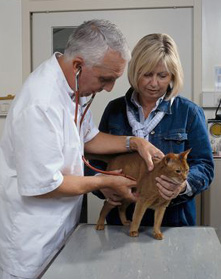Diagnosis of Hyperthyroidism
Your veterinarian will diagnose that your cat is hyperthyroid from the history that you give, a thorough physical examination and laboratory tests.
Conditions such as kidney disease and heart problems are also common in older cats. It is important to check for concurrent diseases, this can influence the choice of treatment and prognosis for your cat.
Laboratory testing
To confirm the diagnosis of hyperthyroidism your veterinarian will take blood samples to measure the levels of thyroxine circulating in the bloodstream and to evaluate your cat’s general condition and make sure it is not suffering from any other diseases.
In some cases, even although your veterinarian strongly suspects that your cat is hyperthyroid, the tests may not be conclusive.
This can be caused by a variety of factors:
- Your cat may be at a very early stage of the disease
- Thyroid hormone levels can fluctuate and can even be normal at some point in hyperthyroid cats.
- Other diseases can influence thyroid hormone levels.
Your veterinarian may need to repeat the blood tests after a week or so.
In some cases in might be necessary to carry out additional tests as well.
These tests could include:
- Special tests to evaluate thyroid gland function
- Diagnostic imaging (e.g. nuclear scintigraphy, ultrasound) of the thyroid, particularly before radio-iodine therapy or corrective surgery is done.

A diagnosis is made from the history that you give, a thorough physical examination and laboratory tests.

